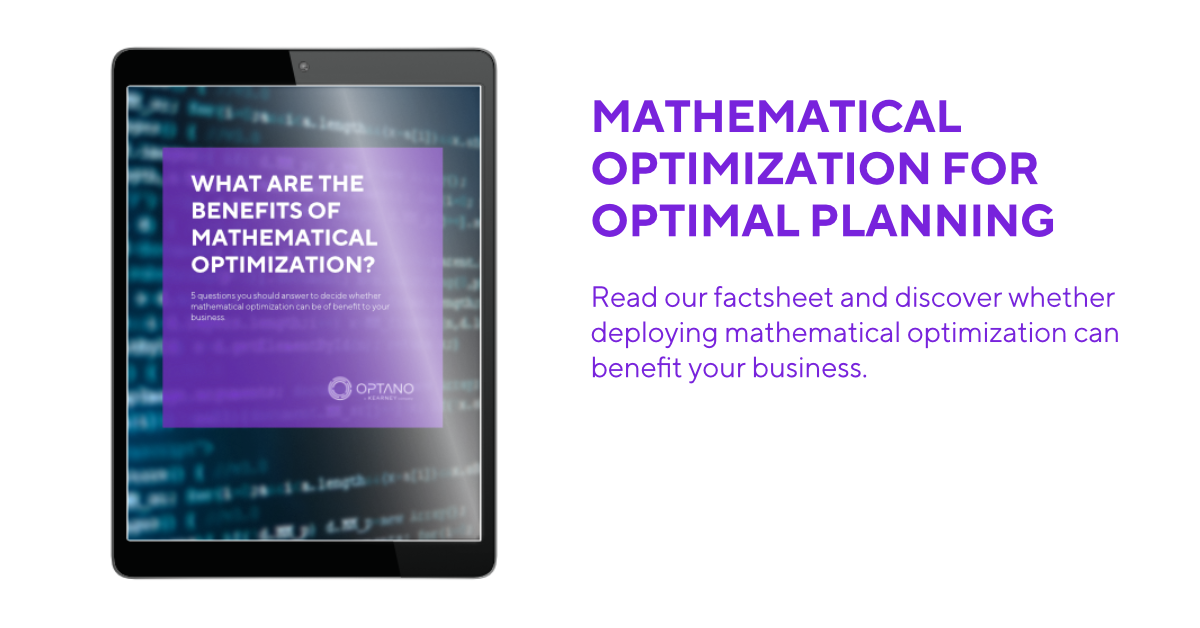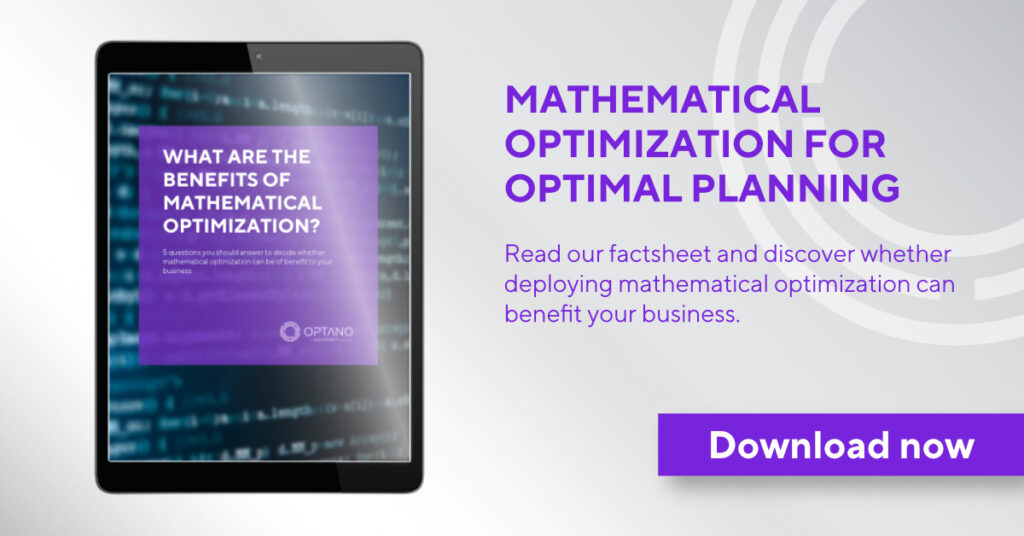Operations Research:
a fast growing
job sector
If we were to ask which professionals and skilled workers you think will be the most sought after in the near future, what would you say? Healthcare workers? Or manual workers such as bakers and butchers, carpenters and plumbers?
Well, you wouldn’t be wrong. Now that the baby boomers are reaching old age, more workers in healthcare-related fields such as nurses and homehelps will be needed and we have long been made aware of the shortage of workers in manual jobs.
However, another area is expected to see rapid job growth, namely in Operations Research (OR), a field which is little known as a profession. However, the job outlook for Operations Research specialists, such as analysts, is highly favorable: The US Bureau of Labor predicts employment growth of 25% in the field until 2030 – and that is in the USA alone.
More data is creating more jobs
Firstly, let us just clarify what Operations Research actually is, namely: an area of knowledge which deals with analyzing and solving practical, complex problems and to support decision-making in an organization’s strategic and operational processes. The problems are broken down into basic components which can then be solved by mathematical analysis.
The main characteristics of OR procedures are:
- Optimization: By comparing all the possible options, the optimal solution can be found.
- Simulation: By building models of a specific business area or of an entire company, you can test the possible solutions in what-if scenarios, for example.
- Probability: Using mathematical algorithms and all the relevant data, targets are determined with respect to constraints and variables in order to make reliable predictions
Operations Research is applied in many areas such as scheduling, route optimization, network planning, supply chain planning, urban planning and many more. It is used to simplify many of the things we take for granted every day like our streaming services and public transport. But, let us return to the question as to why the sector is growing so fast…
Well, quite simply, businesses, agencies and public institutions have been amassing vast amounts of data over the years and will continue to do so in the near future as well. This is valuable data that can provide companies with the insights they need to help them make better decisions, solve problems more easily, better understand how they perform and thus improve processes, and last but not least, it can help a business understand its consumers far better. In other words, a company that is able to make sense of all its data, i.e. which is data-driven, has a major competitive advantage. And this is where the Operations Research analysts enter the picture.

Are you interested in our factsheet?
What are the benefits of mathematical optimization?
What exactly does an Operations Research Analyst do?
In short, an Operations Research Analyst solves complex problems using optimization, statistical analysis and mathematical modeling to develop optimal solutions. Let us explain this more clearly in the example below:
A corporation that wants to lay new underwater cables to generate electricity for an offshore windfarm is faced with the problem of how these can be laid for maximum output yet at minimum cost. This is the problem which the Operations Research Analyst needs to solve.
Based on the objectives (i.e. maximum output, minimum cost), he/she will consider all the possibilities for action which need to be taken in order to reach these objectives. For example, how can the cables be laid, how many are necessary, what kind of cables, etc?). Once these have been determined, the mathematical model of the real problem will be created. The OR Analyst will then enter into the model as much relevant data as possible: costs, performance, details on the cables (type of material, measurements, the amount of electricity that needs to be transported, etc.). Perhaps external data sources can also be used, e.g. meteorological data. With the help of special solvers and simulation, the model will then calculate and visualize the optimal solution based on the data which has been entered.
You can learn more about this business problem and how it can also be applied to solve other common network planning and transport problems by testing our demo here.
More interesting articles
Where can Operations Research Analysts work?
Today, many large corporations employ OR Analysts with the necessary degree qualifications – at least a Master’s degree in the discipline of Operations Research, but also in computer science, industrial engineering and mathematics. These can apply their expertise in mathematical optimization to help the corporation improve its operations and identify optimal solutions.
However, it is not just large corporations which require OR: Their know-how is also in demand by institutions, the finance sector and management consultancies as well as tech and software companies which apply Operations Research methods in the planning software they create.
OPTANO relies on the expertise of its Operations Research Analysts
OPTANO uses OR procedures such as mathematical optimization to find solutions to your most complex planning problems and supports your business in its decision-making processes. It can be customized to meet your requirements and helps in the optimization of supply chain management, production planning, network planning and many more. Based on Prescriptive Analytics methods, OPTANO provides sound recommendations on the best course of action to take in your strategic, operational and tactical planning processes, ensuring that they are efficient, fast and flexible.
Operations Research: a fascinating field in which to work
An interview with Dr. Sebastian Milz, Senior Analytics Software Engineer, Project Manager and OR expert at OPTANO
What made you want to specialize in Operations Research?
Dr. Sebastian Milz: While doing my math degree I enjoyed dealing with graph theory and mathematical optimization. I learned that most OR problems can be described by graphs or networks and that they can be solved using mathematical optimization. This is why I became particularly interested in pursuing Operations Research as a career. Furthermore, it’s fascinating to deal with practical problems and help clients solve them.
What motivated you to start at OPTANO and what are your main tasks?
Dr. Sebastian Milz: Well, apart from the great team here at OPTANO, what really motivated me was that I have the opportunity to apply mathematical concepts and methods. It was – and still is – important for me to be able to apply my theoretical knowledge in my practical work. I’m working as a Project Manager at the interface between client and developer. The main part of my work is the conceptualization and specification of the applications that are to be developed so that the clients’ requirements can be implemented successfully. No less important are tasks such as organization within the project team and also controlling.
What do you enjoy most about your job?
Dr. Sebastian Milz: I personally enjoy creating and implementing mathematical optimization models most of all. It is always fascinating to exactly describe complex practical problems and solve them. It’s also good to work together with a team that enjoys working on mathematical problems just as much as I do.
OPTANO has experience
If you would like to learn more about how OPTANO and mathematical optimization in particular can help you with your planning problems, simply download our factsheet “What are the benefits of mathematical optimization?”. If you have any other questions, then why not contact us today? Our consultants would be happy to help you further. Alternately, send us an e-mail and we will get back to you.
OR Analysts can unleash their potential at OPTANO
OPTANO provides the ideal working environment for Operations Research Analysts to apply their know-how in exciting client projects. Unleash your potential and help us to take OPTANO to the next level.
Interested? You will find more information about OR jobs on our Careers page.
Have you got your copy of our factsheet on this topic yet?

In our factsheet “What are the benefits of mathematical optimization?” we ask 5 questions to help you assess whether mathematical optimization brings benefits to your organization.
To obtain our factsheet, all you need to do is enter your contact details in the space below. A pop-up window will then open to download the whitepaper. Please note that by providing us with your email address, you agree that we may contact you on this topic. You may revoke this agreement at any time by contacting [email protected].







